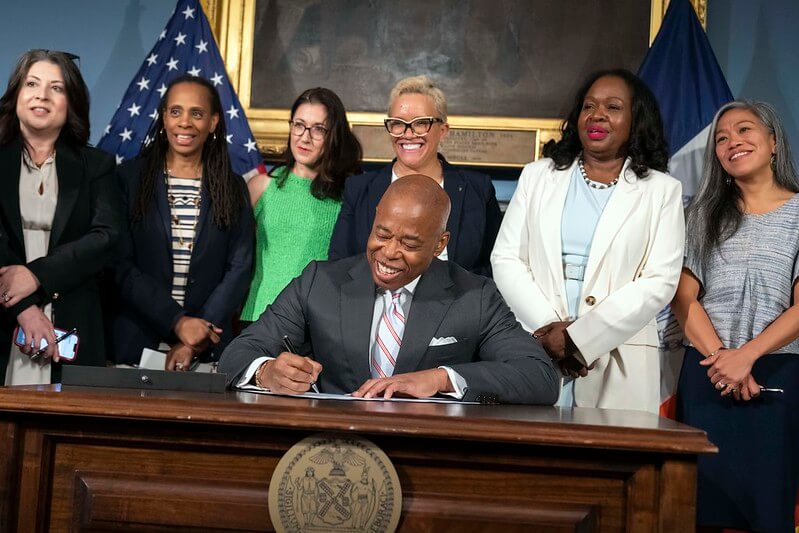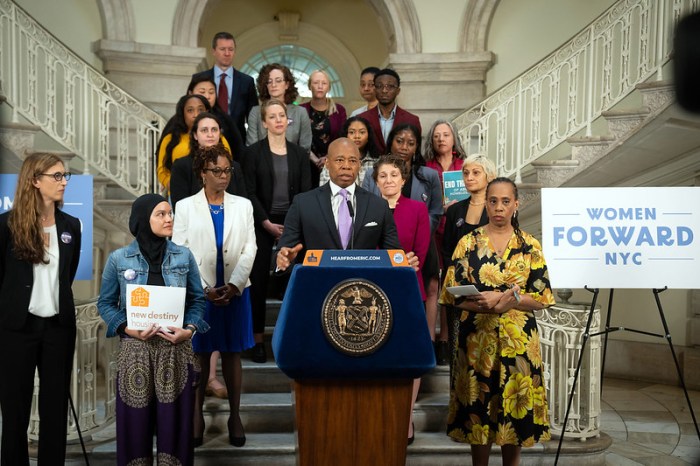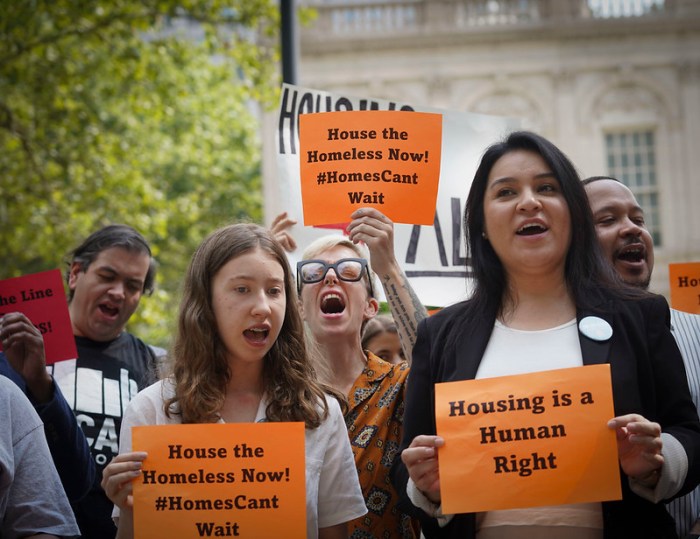Mayor Eric Adams signed an emergency rule on Friday to nix the mandate that people must spend 90 days in homeless shelters to access city housing vouchers, a month after the City Council passed a bill doing the same thing.
The move comes as Adams’ office faces ongoing struggles with finding shelter for tens of thousands of recently-arrived migrants, over 48,000 of whom are currently in the city’s care.
Despite Adams’ action, the possibility of a battle with the council over a package of four bills it passed last month that includes a measure to permanently suspend the so-called 90-day rule, as well as enact other provisions to expand access to housing vouchers — known as CityFHEPS — still looms. The mayor opposes the package because of the measures it contains outside of suspending the 90-day rule, because he says they would cost city taxpayers too much.
The council, however, passed all four bills by a 41-7 vote margin, giving it the numbers needed to override any potential veto from the mayor.
The rule change will take effect immediately, as the mayor signed it on an emergency basis during a City Hall press conference on Friday morning. But it still must go through a ruling-making process with the state Office of Temporary and Disability Assistance (OTADA), according to the mayor’s office.
The rule change, which will apply to both single adults and families, is intended to make it easier for those living in shelter to more quickly move into permanent housing.
“This will end the long-standing 90-day length of stay requirement for our CityFEPS rental assistance program, effective immediately,” Adams said. “The rule change will help get more families and single adults in shelter the help they need when they need it, with more precision and less red tape and bureaucracy.”
Adams requirement that advocates have long sought to eliminate, a year after first pledging to during a press conference where he unveiled his housing plan. The council and advocates have also spent the last several months calling on the administration to terminate the waiting period as a way to move more homeless people into permanent housing and make more space for migrants in city shelters.
The mayor said he decided to make the rule change himself instead of simply signing the council bill that would essentially do the same thing, because he supports repealing the 90-day rule but not enacting the other bills in the package.
Adams’ main reason for opposing those other measures, which would expand voucher eligibility to any applicant deemed at risk of eviction and anyone making 50% of the Area Median Income (AMI), is they would cost the city an estimated $17 billion over the next five years. But the council disputes that figure and says they would actually cost $11 billion over the same time period.
The mayor argued the package would also add to an already existing backlog of about 20,000 voucher holders who aren’t able to find housing due to the lack of available apartments across the five boroughs.
“When you look at the entire package that they’ve presented, some of the items in that package are problematic,” the mayor said. “It’s going to cost New Yorkers, I think [the council’s] estimate was $11 billion, our estimate is in the area of $17 billion. We have 20,000 vouchers out there currently. And to add that pool to those who fall back [on] their rent for a short period of time, you’re just going to make it difficult for those who are in homeless shelters now, for them to get out.”
The council argues getting more people into permanent housing would ultimately cost the city less money because of the expense associated with stays in city shelters.
It, however, remains unclear if the mayor will actually veto the bills, sign them or let them lapse into law. When pressed by reporters if he intends to give the legislation a thumbs down, Adams said he’s still reviewing his options.
“The team is still deciding how are we going to move forward [with] the entire package and once we do, we will let you let you guys know right away,” Adams told reporters.
The mayor has a little over a week to either veto or sign the bills, otherwise they’ll lapse into law — taking effect six months after, according to City Council Speaker Adrienne Adams’ office.
In a statement, Speaker Adams took aim at the amount of time it took the administration to end the 90-day rule, saying it was one of “several counterproductive barriers that the administration failed to take action to eliminate.”
“While we welcome the administration finally seeming to drop its opposition to end the 90-day rule, the council’s legislation importantly codifies the change and provides a more comprehensive approach to remove other obstacles to housing vouchers that can help protect New Yorkers,” the speaker said. “The only reliable path forward to truly confront the city’s eviction and homelessness crises is for the Mayor to sign the entire package of legislation.”
Read more: Make Music Day NYC Returns with Free Performances Across the City



































